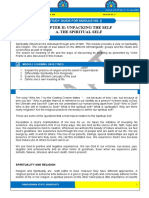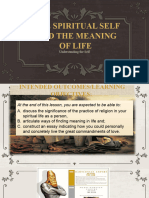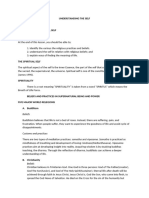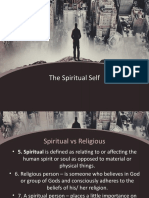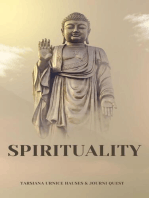CASIMSIMAN_ conception act#2
Uploaded by
casimsiman.reaCASIMSIMAN_ conception act#2
Uploaded by
casimsiman.reaRea C.
Casimsiman GEC SELF [ A] 12:00-2:00 PM M-F
BSBA- FM 1 July 15, 2024
CONCEPTION ACTIVITY 1.2
1.What is the difference between spirituality and religion?
ANSWER:
Spirituality is defined as relating to or affecting the human spirit or soul as opposed material
or physical things. While Religion is defined as the belief in and worship of a superhuman can
controlling power, especially a personal God or gods. It is also a particular system of faith and
worship. Spirituality and religion are both paths of God.
2. How can we practice spirituality?
> What are the struggles or benefits of practicing spirituality without the guidance of religion?
ANSWER:
Practicing spirituality without the guidance of religion can be both challenging and
rewarding. One of the primary struggles is the lack of structure, as individuals may find it
difficult to navigate their spiritual journey without the doctrines that religion provides. This
can lead to a sense of isolation and uncertainty, as there is no built-in community or clear
guidelines to follow. Additionally, there may be a cultural disconnection, as many spiritual
practices are deeply intertwined with religious and cultural traditions. However, there are
significant benefits to this approach. Personal freedom is a major advantage, allowing
individuals to explore and define their spirituality based on personal beliefs, experiences, and
values without being confined to religious dogmas. This flexibility enables the integration of
diverse practices from various traditions, creating a unique spiritual path. Moreover, this
inclusive approach can focus on shared human values and experiences, fostering a sense of
universality. Emphasizing personal experiences and inner growth can lead to a deeper, more
individualized understanding of spirituality, promoting profound personal development and
fulfillment.
3. Is religion necessary yes, or no? (do not based on your opinion alone, do some research)
ANSWER:
Whether religion is necessary depends on individual perspectives and needs.
For some, religion provides essential structure, community, moral guidance, and a sense of
belonging. It can offer a framework for understanding the world and coping with life's
challenges. For others, spirituality, philosophy, or personal values can fulfill these needs
without organized religion. They may find meaning, purpose, and ethical guidance outside
traditional religious frameworks. Hence, the necessity of religion is subjective and varies
based on personal beliefs, cultural background, and individual experiences.
4. Do you believe in God? (personally why, create your best argument if yes or no)
ANSWER:
Personally, I believe in God, my argument for this is the quote of the Russian novelist
Dostoevsky, "If God does not exist, then everything is permissible", but not everything is
permitted. Therefore, God exists. In line with this, for me there is a moral restraint among
individuals and there is a moral restraint among people in society, because there is a voice
telling them to behave and this voice is commonly known as conscience or "the little voice of
God". Hence, God exists.
5. What is the soul according to the ethnic groups in the Philippines? & What are type of
rituals?
ANSWER:
The concept of the soul among ethnic groups in the Philippines is diverse and deeply rooted in
their cultural and spiritual beliefs, thus they have different names but have the same thought.
For instance, the Tagalog people believe in the "kaluluwa," which is the soul that departs the
body upon death and journeys to the afterlife. Similarly, the Ilocano’s have a belief in the
"aniwaas," a soul that continues to exist and can interact with the living. The Tausug of
Mindanao believe in multiple souls within a person, each responsible for different aspects of
life and health. These are some of the examples of the concept of soul according to the ethnic
groups in the Philippines. Various rituals are performed to honor and communicate with these
souls. There are 4 major types of rituals namely, imitative, positive & negative, sacrificial and
life crisis. For example, the Tagalog practice the "pag-aanito," a ritual involving offerings and
prayers to ancestral spirits which is classified as sacrificial ritual. The Ifugao perform the
"bogwa," an exhumation and reburial ceremony to ensure the soul's peaceful journey, in which
it is classified as life crisis ritual. The Tausug also conducts life crisis ritual known as the
"pagdudus," a ritual to heal ailments believed to be caused by restless or troubled souls. These
rituals reflect the rich spiritual tapestry of the Philippines, where the soul is revered and
interconnected with the living and the divine.
You might also like
- Chapter Ii: Unpacking The Self A. The Spiritual Self: Study Guide For Module No. 9No ratings yetChapter Ii: Unpacking The Self A. The Spiritual Self: Study Guide For Module No. 910 pages
- Chapter II Lesson 7 The Spiritual Self RevisedNo ratings yetChapter II Lesson 7 The Spiritual Self Revised30 pages
- Chapter 7 Understanding The Self SummaryNo ratings yetChapter 7 Understanding The Self Summary4 pages
- The Search for Meaning: A Journey Through World Spiritual Traditions and PracticesFrom EverandThe Search for Meaning: A Journey Through World Spiritual Traditions and PracticesNo ratings yet
- Understanding The Self: University of Caloocan CityNo ratings yetUnderstanding The Self: University of Caloocan City10 pages
- 7 Steps to Finding Your Spiritual Life: 7 Steps to Finding Your Spiritual PathFrom Everand7 Steps to Finding Your Spiritual Life: 7 Steps to Finding Your Spiritual PathNo ratings yet
- The Spiritual Connection: Explore your potential through a spiritually centered lifeFrom EverandThe Spiritual Connection: Explore your potential through a spiritually centered lifeNo ratings yet
- Understanding The Self Lesson 9 The Spiritual Self HANDOUTNo ratings yetUnderstanding The Self Lesson 9 The Spiritual Self HANDOUT25 pages
- Spirituality: Part 1- Key to Physical and Mental Well-Being & Part 2- the Modern Perceptual Shift (Preference for Emotional Responses as Reality)From EverandSpirituality: Part 1- Key to Physical and Mental Well-Being & Part 2- the Modern Perceptual Shift (Preference for Emotional Responses as Reality)No ratings yet
- Spirituality and Self-Healing: Navigating Life's Challenges with Grace and WisdomFrom EverandSpirituality and Self-Healing: Navigating Life's Challenges with Grace and WisdomNo ratings yet
- A Treasure of Great Spiritual Stories: Spirituality in Everyday LivingFrom EverandA Treasure of Great Spiritual Stories: Spirituality in Everyday LivingNo ratings yet
- GEC1 Spiritual Self and the Meaning of Life Lesson 7No ratings yetGEC1 Spiritual Self and the Meaning of Life Lesson 770 pages
- THSELF1 Unit II Chapter 6 - Spiritual Self PDFNo ratings yetTHSELF1 Unit II Chapter 6 - Spiritual Self PDF6 pages
- CASIMSIMAN_ fillable forms (all methods)No ratings yetCASIMSIMAN_ fillable forms (all methods)5 pages
- Institutional Format for Research Paper (1)No ratings yetInstitutional Format for Research Paper (1)31 pages
- Scheme of Work - Modern Europe, 1750-1921No ratings yetScheme of Work - Modern Europe, 1750-192138 pages
- The Concept of God in The Igbo TraditionNo ratings yetThe Concept of God in The Igbo Tradition11 pages
- Chapter 4 Social and Cultural Environments: Global Marketing, 9e (Keegan)No ratings yetChapter 4 Social and Cultural Environments: Global Marketing, 9e (Keegan)29 pages
- In The Minds of Men: Darwin and The New World Order, by Ian T. Taylor100% (4)In The Minds of Men: Darwin and The New World Order, by Ian T. Taylor543 pages
- Michael Martin, Keith Augustine - The Myth of An Afterlife - The Case Against Life After Death (2015, Rowman & Littlefield Publishers) - Libgen - LiNo ratings yetMichael Martin, Keith Augustine - The Myth of An Afterlife - The Case Against Life After Death (2015, Rowman & Littlefield Publishers) - Libgen - Li708 pages
- J6pe1h9c9 - Grade 11 Philippine Politics and Governance Long QuizNo ratings yetJ6pe1h9c9 - Grade 11 Philippine Politics and Governance Long Quiz3 pages
- The Problem With Some Young Goths and The Unintentional Erasure of The Goth SubcultureNo ratings yetThe Problem With Some Young Goths and The Unintentional Erasure of The Goth Subculture4 pages
- THE Communication of Mental Health Information: A Comparison Opinions of Experts and Public With Mass Media Presentations'No ratings yetTHE Communication of Mental Health Information: A Comparison Opinions of Experts and Public With Mass Media Presentations'9 pages
- Nikola Pantic - Sufism in Ottoman Damascus (Routledge Sufi Series) (2023)No ratings yetNikola Pantic - Sufism in Ottoman Damascus (Routledge Sufi Series) (2023)251 pages



